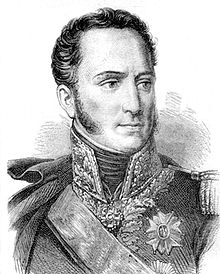Armand-Augustin-Louis de Caulaincourt
| Armand-Augustin-Louis de Caulaincourt | |
|---|---|

General Caulaincourt, Duke of Vicenza.
|
|
| Born |
9 December 1773 Caulaincourt, Aisne, France |
| Died | 19 February 1827 (aged 53) Paris, France |
| Allegiance |
|
| Years of service | 1788–1815 |
| Rank | General of Division |
| Battles/wars |
French Revolutionary Wars, Napoleonic Wars |
| Awards |
Name inscribed under the Arc de Triomphe, Duke of Vicenza |
| Relations |
Gabriel Louis de Caulaincourt (father), Auguste-Jean-Gabriel de Caulaincourt (brother), |
| Other work |
Minister of Foreign Affairs, Grand Marshal of the Palace, Ambassador to Saint-Petersburg |
Armand-Augustin-Louis, Marquis de Caulaincourt, Duke of Vicenza (9 December 1773 – 19 February 1827) was a French soldier, diplomat, grand officer of the Grand Orient de France and close personal aide to Napoleon I.
Armand de Caulaincourt was the eldest son of Louis Gabriel de Caulaincourt, the Marquis de Caulaincourt, a nobleman and general officer in the army. Born in Caulaincourt, Aisne in the French region of Picardy, he began service in the army at the age of 15, serving as an aide to his father.
By the time of the declaration of war in 1792 Caulaincourt had been promoted to captain and was serving as an adjutant on the staff of his uncle, Harville. His lineage as a noble made him suspect by the revolutionaries, causing Caulaincourt to volunteer to serve in the French Garde Nationale in Paris as a common soldier. While on his way to join his regiment he was denounced as an aristocrat and thrown into prison. He escaped prison, and returned to serving in the army. In three years he had regained his previous rank and was serving General Lazare Hoche. He attained the rank of colonel in the Army of the Rhine. By 1801 Caulaincourt had been involved in thirteen campaigns and wounded twice.
Caulaincourt was fluent in a number of languages, including Russian. After the peace of Lunéville in 1801 he was sent to Saint Petersburg by First Consul Napoleon Bonaparte. His mission was primarily to check British influence in the Russian court.
On his return he was named aide-de-camp of Napoleon. At this juncture an event occurred which was to profoundly affect his life. In 1804 Caulaincourt had been sent by Napoleon across the Rhine to seize some agents of the British government who were in Baden. He was used to pass on orders calling for the seizure and transport to Paris of Louis Antoine de Bourbon, the Duke of Enghien. Once in Paris the Duke of Enghien was tried for treason by a military tribunal and summarily executed. Caulaincourt, an aristocrat, had been used as a means to deliver a fellow aristocrat to his death. When Caulaincourt returned to Paris he learned of the Duke's execution, and wept openly over it. He was incensed that he had been used in this way, and the event forever gave supporters of the Bourbon monarchy a means by which to impugn Caulaincourt's integrity and honor. The shroud of idealism which had earlier colored his view of Napoleon was forever pulled away. From then on, though he treated Napoleon with courtesy, there was always a reserve, and he made a point to be frank in informing the Emperor of what he felt were the true motives behind the Emperor's policies. The event was a point of shame that would haunt Caulaincourt for the rest of his days.
...
Wikipedia
